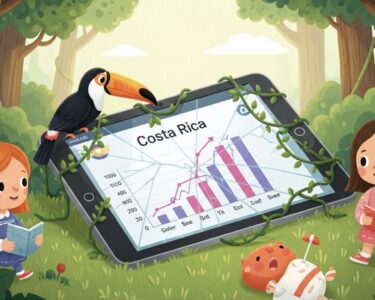San José, Costa Rica — SAN JOSÉ – Costa Rica’s economy experienced its third consecutive month of falling prices, with year-over-year inflation for September registering at -1%, according to the latest Consumer Price Index (CPI) data released Tuesday by the National Institute of Statistics and Censuses (INEC).
The report underscores a persistent deflationary trend that is becoming a significant concern for economic policymakers. The month-over-month variation for September was -0.40%, contributing to an accumulated deflation of -1.95% for the first three quarters of 2025. This continued slide in the general price level signals potential underlying weaknesses in consumer demand and economic activity.
To delve into the contractual and business ramifications of a deflationary environment, TicosLand.com consulted with Lic. Larry Hans Arroyo Vargas, a legal expert from the renowned firm Bufete de Costa Rica.
Deflation presents a significant legal challenge, particularly for existing contracts. As the real value of debt increases, debtors may face unforeseen hardship, potentially triggering clauses on default or even grounds for renegotiation under principles of commercial equity. Businesses must proactively review their long-term financial agreements and supply contracts to mitigate risks of insolvency and contractual disputes in a falling-price environment.
Lic. Larry Hans Arroyo Vargas, Attorney at Law, Bufete de Costa Rica
Indeed, the legal ramifications for existing agreements represent a critical, and often underestimated, facet of a deflationary economy. We extend our sincere gratitude to Lic. Larry Hans Arroyo Vargas for his expert insight, which serves as a vital reminder for businesses to scrutinize their contractual foundations.
Despite the negative headline figure, the consumer experience remains complex and varied. The INEC report revealed a fascinating paradox: while the overall index fell, a plurality of the individual goods and services tracked actually became more expensive. Of the 289 items in the CPI basket, 47% recorded a price increase in September. In contrast, 37% saw a price decrease, and the remaining 16% showed no change from the previous month.
This divergence indicates that the deflationary pressure is highly concentrated in specific sectors rather than being a widespread phenomenon across the entire economy. A handful of significant price drops are heavily weighing down the overall index, masking inflationary pressures elsewhere that continue to affect household budgets.
The primary drivers behind September’s deflation were steep declines in key consumer categories. The most impactful decreases were seen in mobile telephony services, which plummeted by 8.92%, and fresh produce like tomatoes, which saw a staggering 30.42% price drop. Other significant contributors to the downward trend included airfare (-4.45%), ground beef (-4.60%), various cuts of pork (-5.60%), and home appliances such as washing machines (-5.79%).
Conversely, several essential goods and services saw notable price hikes, preventing a more severe deflationary reading. University education costs rose by 1.24%, and the price of new automobiles ticked up by 0.91%. In the food category, consumers paid more for fish fillet (+5.65%), cooking oil (+2.68%), potatoes (+3.82%), and beans (+1.55%). Transportation costs were also affected, with diesel fuel increasing by 2.35%.
This prolonged period of deflation presents a challenging scenario for the Central Bank of Costa Rica. While falling prices may seem beneficial to consumers in the short term, sustained deflation can stifle economic growth. It can lead to consumers delaying large purchases in anticipation of even lower prices, reduce corporate profits, and increase the real burden of debt for both individuals and businesses.
Analysts will be closely watching the Central Bank’s next moves. The persistent negative inflation could prompt monetary authorities to consider further loosening policy to stimulate demand and steer the economy back toward a stable, low-inflation environment. The current data paints a picture of an economy at a crossroads, where targeted deflation in some areas coexists with stubborn inflation in others, complicating the path forward for national economic strategy.
For further information, visit inec.cr
About Instituto Nacional de Estadística y Censos (INEC):
The National Institute of Statistics and Censuses is the official government body of Costa Rica responsible for the collection, analysis, and dissemination of the country’s official statistics. It manages crucial data including national censuses, economic indicators like the Consumer Price Index, and social demographics, providing essential information for public policy, academic research, and business decision-making.
For further information, visit bufetedecostarica.com
About Bufete de Costa Rica:
Bufete de Costa Rica is an esteemed law firm built upon the bedrock principles of professional integrity and a drive for unparalleled excellence. The firm leverages its rich history of advising a diverse clientele to pioneer innovative legal strategies, consistently staying ahead of an evolving legal landscape. Beyond its professional practice, a core tenet of its mission is the empowerment of the community through accessible legal education, reflecting a deep-seated belief in fostering a society where knowledge fortifies justice and empowers citizens.









